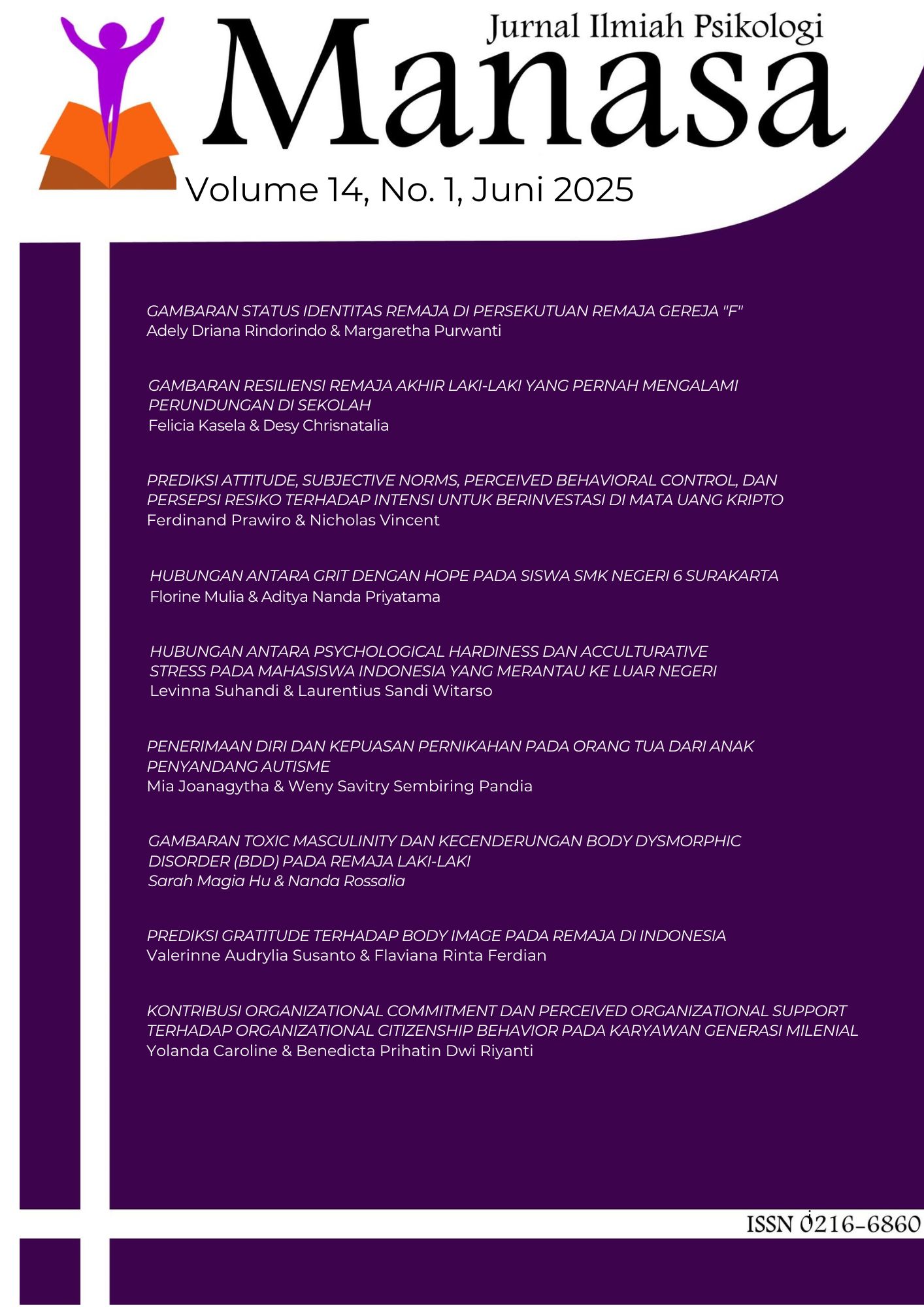Gambaran Resiliensi Remaja Akhir Laki-Laki Yang Pernah Mengalami Perundungan Di Sekolah
DOI:
https://doi.org/10.25170/manasa.v14i1.6659Keywords:
resilience, bullying , late adolescents, schoolAbstract
Bullying is a common phenomenon among adolescents, particularly in school settings. It involves acts of violence against individuals perceived as weaker within the school environment. Victims of school bullying may experience lasting negative effects that persist into late adolescence. Resilience, the ability to navigate and recover from difficult experiences, plays a crucial role in helping individuals cope with adversity. Research has identified differences in resilience between males and females, but there is limited exploration of resilience specifically in late adolescent males who have experienced bullying in schools. This study aims to examine resilience among late adolescent males who have faced bullying in schools. Using a qualitative approach with a thematic reflexive analysis, data was collected through semi-structured interviews with three late adolescent male participants, and then analyzed thematically. The findings indicate that all three participants demonstrate resilience in their current lives, reflected in key aspects such as emotional regulation (managing emotions effectively), impulse control (restraining harmful impulses), optimism (maintaining positive expectations for the future), causal analysis (recognizing bullying as a result of power imbalance), empathy (understanding the emotions of others), self-efficacy (confidence in their own abilities), and reaching out (taking initiative to achieve results). Additionally, social support played a significant role in fostering resilience among the participants.
References
American Psychological Association (APA) (2020). Building Your Resilience. Available online at: https://www.apa.org/topics/resilience
Anderson, M. (2018, September 27). A majority of teens have experienced some form of cyberbullying. Pew Research Center. https://www.pewresearch.org/internet/2018/09/27/a-majority-of-teens-have-experienced-some-form-of-cyberbullying/
Andreou, E., Roussi‐Vergou, C., Didaskalou, E., & Skrzypiec, G. (2020). School bullying, subjective well‐being, and resilience. Psychology in the Schools, 57(8), 1193–1207. https://doi.org/10.1002/pits.22409
Annalakshmi Narayanan & Lucy R. Betts (2014) Bullying Behaviors and Victimization Experiences Among Adolescent Students: The Role of Resilience, The Journal of Genetic Psychology, 175:2, 134-146, DOI: 10.1080/00221325.2013.834290
Arofa, I. Z., Hudaniah, & Zulfiana, U. (2018). Pengaruh perilaku bullying terhadap empati ditinjau dari tipe sekolah. Jurnal Ilmiah Psikologi Terapan, 6. https://ejournal.umm.ac.id/index.php/jipt/article/view/5435/pdf
Arseneault, L., Bowes, L., & Shakoor, S. (2010). Bullying victimization in youths and mental health problems: 'much ado about nothing'?. Psychological medicine, 40(5), 717–729. https://doi.org/10.1017/S0033291709991383
Boardman, J., Blalock, C., & Button, T. (2008). Sex differences in the heritability of resilience. Twin Research and Human Genetics, 11(1), 12-27. https://doi.org/10.1375/twin.11.1.12
Braun, V., & Clarke, V. (2019). Reflecting on reflexive thematic analysis. Qualitative Research in Sport, Exercise and Health, 11(4), 589-597.
https://doi.org/10.1080/2159676X.2019.1628806
Carlisle, N., & Rofes, E. (2007). School bullying: Do adult survivors perceive long-term effect. Sage Publications, 13(1), 16-26. https://doi.org/10.1177/1534765607299911
Copeland WE, Wolke D, Angold A, Costello EJ. Adult Psychiatric Outcomes of Bullying and Being Bullied by Peers in Childhood and Adolescence. JAMA Psychiatry. 2013;70(4):419–426. doi:10.1001/jamapsychiatry.2013.504
Creswell, J. W. (2007). Qualitative inquiry and research design: Choosing among five approaches (2nd ed.). Sage Publications, Inc.
Crick, N. R., and Grotpeter, J. K. (1995). Relational aggression, gender, and social-psychological adjustment. Child Dev. 66, 710–722. doi: 10.1111/j.1467-8624. 1995.tb00900.x DOI: 10.26539/pcr.32665
Erdogan, E., Ozdogan, O., & Erdogan, M. (2015). University students’ resilience level: The effect of gender and faculty. Procedia - Social and Behavioral Sciences, 186, 1262–1267. https://doi.org/10.1016/j.sbspro.2015.04.047
Etikan, I., Musa, S. A., & Alkassim, R. S. (2016). Comparison of convenience sampling and purposive sampling. American Journal of Theoretical and Applied Statistics, 5, 1-4. https://doi.org/10.11648/j.ajtas.20160501.11
Foody M, McGuire L, Kuldas S and O’Higgins Norman J (2019) Friendship Quality and Gender Differences in Association with Cyberbullying Involvement and Psychological Well-Being. Frontiers in Psychology, 10:1723. doi: 10.3389/fpsyg.2019.01723
Fu, Q., & Land, K. C. (2012). Bullying victimization, socioeconomic status and behavioral characteristics of 12th graders in the United States, 1989 to 2009: Repetitive trends and persostent risk differentials. Child Indicators Research, 6, 1-21. https://doi.org/10.1007/s12187-012-9152-8
Gaffney, H., Ttofi, M. M., & Farrington, D. P. (2021). What works in anti-bullying programs? Analysis of effective intervention components. Journal of school psychology, 85, 37–56. https://doi.org/10.1016/j.jsp.2020.12.002
García-Vázquez, F. I., Valdés-Cuervo, A. A., & Parra-Pérez, L. G. (2020). The Effects of Forgiveness, Gratitude, and Self-Control on Reactive and Proactive Aggression in Bullying. International Journal of Environmental Research and Public Health, 17(16), 5760. https://doi.org/10.3390/ijerph17165760
Harcourt, S., Jasperse, M., & Green, V. A. (2014). “We were sad and we were angry”: A systematic review of parents’ perspectives on bullying. Child & Youth Care Forum, 43(3), 373–391. https://doi.org/10.1007/s10566-014-9243-4
Hellström, L., & Beckman, L. (2020). Adolescents' perception of gender differences in bullying. Scandinavian journal of psychology, 61(1), 90–96. https://doi.org/10.1111/sjop.12523
Huang L, Mossige S. Resilience and poly-victimization among two cohorts of norwegian youth. (2018). International Journal of Environmental Research and Public Health, 15:2852. doi: 10.3390/ijerph15122852
Juvonen, J., & Graham, S. (2014). Bullying in schools: the power of bullies and the plight of victims. Annual Review of Psychology, 65, 159–185. https://doi.org/10.1146/annurevpsych-010213-115030
Kelly, E. V., Newton, N. C., Stapinski, L. A., Slade, T., Barrett, E. L., Conrod, P. J., & Teesson, M. (2015). Suicidality, internalizing problems and externalizing problems among adolescent bullies, victims and bully victims. Preventative Medicine, 73, 100–105.https://doi.org/10.1016/j.ypmed.2015.01.020
Kurniati, N., Purnamasari, I., & Rahmawati, I. (2023). Analysis of the Impact of Verbal Bullying on Elementary School Children. Jurnal Ilmiah Wahana Pendidikan, 9(20), 383-393. https://doi.org/10.5281/zenodo.8418631
Lereya, S. T., Copeland, W. E., Zammit, S., & Wolke, D. (2015). Bully/victims: a longitudinal, population-based cohort study of their mental health. European Child & Adolescent Psychiatry, 24(12), 1461–1471. https://doi.org/10.1007/s00787-015-0705-5
Lin, L. Y., Chien, Y. N., Chen, Y. H., Wu, C. Y., & Chiou, H. Y. (2022). Bullying Experiences, Depression, and the Moderating Role of Resilience Among Adolescents. Frontiers in Public Health, 10, 872100. https://doi.org/10.3389/fpubh.2022.872100
Marlow, C., Gönültaş, S., & Mulvey, K. L. (2023). Adolescents’ Expectations for Types of Victim Retaliation Following Direct Bullying. Journal of Youth and Adolescence, 52(3), 533-546. https://doi.org/10.1007/s10964-022-01710-5
Martinez-Torteya, C., Anne Bogat, G., von Eye, A., & Levendosky, A. A. (2009). Resilience among children exposed to domestic violence: The role of risk and protective factors. Child Development, 80(2), 562–577. https://doi.org/10.1111/j.1467-8624.2009.01279.x
Menesini, E., & Salmivalli, C. (2017). Bullying in schools: The state of knowledge and effective interventions. Psychology, Health & Medicine, 22(Suppl. 1), 240-253. https://doi.org/10.1080/13548506.2017.1279740
Moore, B., & Woodcock, S. (2017). Resilience, bullying, and mental health: factors associated with improved outcomes. Psychology in the Schools, 0(0), 1-14. DOI: https://doi.org/10.1002/pits.22028
Mubaroq et al. (2024). Gambaran Resiliensi pada Remaja Korban Cyberbullying. Arjwa: Jurnal Psikologi, 3(2), 73-85 doi https://doi.org/10.35760/arjwa.2024.v3i2.10430
Nurhalimah, N., Haryati, O., Wartonah, W., & Adelia, A. (2025). The impact of verbal bullying on the mental health of students at a senior high school in Bekasi, Indonesia. Healthcare in Low-Resource Settings. https://doi.org/10.4081/hls.2025.13092
Olweus, D. (1993). Bullying at school: What we know and what we can do. Oxford: Blackwell.
Olweus, D. (1994). Bullying at school: Long-term outcomes for the victims and an effective school-based intervention program. In L. R. Huesmann (Ed.), Aggressive Behavior: Current Perspectives (pp. 97–130). Plenum Press. https://doi.org/10.1007/978-1-4757-9116-7_5
Puspita, N., Kristian, Y. Y., & Onggono, J. N. (2019). Resiliensi pada remaja perkotaan yang menjadi korban bullying. Jurnal Perkotaan, 10(1), 45-75. https://doi.org/10.25170/perkotaan.v10i1.307
Reivich, K., & Shatte, A. (2002). The resilience factor: 7 essential skills for overcoming life's inevitable obstacles. Broadway Books.
Rigby, K. (2003). Consequences of bullying in schools. Canadian Journal of Psychiatry, 48(9), 583-590. Rosaliza, M. (2015). Wawancara, sebuah interaksi komunikasi dalam penelitian kualitatif. Jurnal Ilmu Budaya, 11(2), 71-79. https://media.neliti.com/media/publications/100164-ID-wawancara-sebuahinteraksi-komunikasi-da.pdf
Saaduddin, S., Sujadi, E., Sasferi, N., & Jumiarti, D. (2023). The Effect of Self-Esteem on Resilience among Victims of Bullying: Does Gender Play a Role?. Educational Guidance and Counseling Development Journal, 6(1), 1-13. https://ejournal.uin-suska.ac.id/index.php/EGCDJ/article/view/22025/9024
Santrock, J. W. (2019). Life span development (17th ed). Mc Graw Hill, Inc.
Sourander, A., Jensen, P., Rönning, J. A., Niemelä, S., Helenius, H., Sillanmäki, L., Kumpulainen, K., Piha, J., Tamminen, T., Moilanen, I., & Almqvist, F. (2007). What is the early adulthood outcome of boys who bully or are bullied in childhood? The Finnish "From a Boy to a Man" study. Pediatrics, 120(2), 397–404. https://doi.org/10.1542/peds.2006-2704
Subagio, N. A., & Virlia, S. (2024). Resilience in Adolescent Victims of Bullying: The Role of Emotion Regulation and Social Support. Psympathic: Jurnal Ilmiah Psikologi, 11(2), 187-196
Subedi KKP. Theoretical perspective of bullying. International Journal of Health Science and Research, 10(8), 83-89. https://www.ijhsr.org/IJHSR_Vol.10_Issue.8_Aug2020/14.pdf
Sujadi, E., Yandri, H., & Juliawati, D. (2021). Perbedaan resiliensi siswa laki-laki dan perempuan yang menjadi korban bullying. Psychocentrum Review, 3(2), 174-186. https://doi.org/10.26539/pcr.32665
Thomsen, E., Henderson, M., Moore, A., Price, N., and McGarrah, M.W. (2024). Student Reports of Bullying: Results From the 2022 School Crime Supplement to the National Crime Victimization Survey (NCES 2024-109rev). U.S. Department of Education. Washington, DC: National Center for Education Statistics. Retrieved [date] from https://nces.ed.gov/pubsearch/pubsinfo.asp?pubid=2024109rev.
Turner, M. G., Exum, M. L., Brame, R., & Holt, T. J. (2013). Bullying victimization and adolescent mental health: General and typological effects across sex. Journal of Criminal Justice, 41(1), 53–59. https://doi.org/10.1016/j.jcrimjus.2012.12.005
UNICEF Indonesia. (n.d.). Bullying in Indonesia. Retrieved from https://www.unicef.org/indonesia/media/5606/file/Bullying.in.Indonesia.pd
Usop, D. S. (2013). Hubungan antara kematangan emosi dengan penyesuaian diri remaja. Anterior Jurnal, 13(1), 52-55.
Wolke, D., & Lereya, S. T. (2015). Long-term effects of bullying. Archives of disease in childhood, 100(9), 879–885. https://doi.org/10.1136/archdischild-2014-306667
Yuliani, S., Widianti, E., & Sari, S. P. (2018, April). Resiliensi remaja dalam menghadapi perilaku bullying. Jurnal Keperawatan BSI, 6(1), 77-86. http://ejournal.bsi.ac.id/ejurnal/index.php/jk
Yunisca, C. A., & Wibawa, D. S. (2019). Proses resiliensi remaja akhir perempuan yang pernah mengalami bullying verbal karena obesitas. Jurnal Ilmiah Psikologi Manasa, 8(2), 1-22. https://ejournal.atmajaya.ac.id/index.php/Manasa/article/view/1954/1004
Zhang, Y., Li, H., Chen, G., Li, B., Li, N., & Zhou, X. (2024). The moderating roles of resilience and social support in the relationships between bullying victimization and well-being among Chinese adolescents: Evidence from PISA 2018. British Journal of Psychology (London, England : 1953), 115(1), 66–89. https://doi.org/10.1111/bjop.12678
Downloads
Published
Issue
Section
License
Copyright (c) 2025 MANASA

This work is licensed under a Creative Commons Attribution-NonCommercial-ShareAlike 4.0 International License.









.png)
.png)

